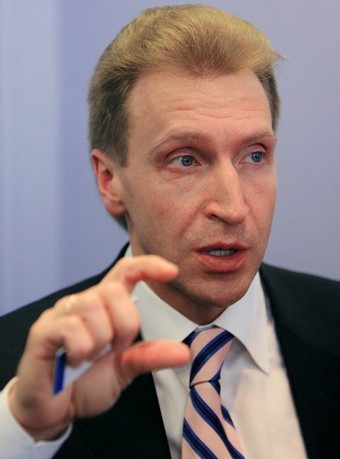
WILL RUSSIA’S FINANCIAL CRISIS UNDERMINE POLITICAL STABILITY?
Publication: Eurasia Daily Monitor Volume: 5 Issue: 202
By:

First Deputy Prime Minister Igor Shuvalov has said that while the Russian state could end up owning a significant share of private companies as the result of bail-out measures currently being implemented, the government had no plans to “nationalize” their stakes and would put them up for sale as soon as market conditions improved. Shuvalov, who heads a recently-created emergency council set up to manage Russia’s financial crisis, told the Financial Times that the state-owned development bank VEB would take shares in companies as collateral for bail-out loans; and if the borrowers default, they would forfeit the collateral. Shuvalov told the newspaper that the government would not “spend internal credit resources” in order to nationalize what was previously privatized. “We don’t have such a goal,” he said. “Our goal is only to provide credit, because the companies that receive these credits are going to survive and develop.” As the Financial Times noted, VEB was recently provided with $50 billion by the state to finance Russian companies’ external debts that fall due before the end of the year (Financial Times, October 22).
On October 20 former Kremlin economic adviser Andrei Illarionov charged that the Russian government was using the financial crisis as a pretext to seize further control of the country’s economy. Illarionov, who is now a senior fellow at the libertarian Cato Institute in Washington, D.C., criticized both the Russian government’s bailout plans and those of Western governments, which were buying equity stakes in failing banks. Russia’s bailout was worse, however, because it was spending around 12 percent of the GDP, compared with 5 percent in the United States, and was bailing out “a small circle of corporations and banks that have special relations with the authorities or belong to the state,” Illarionov said. “In other words, the crisis is being used for a redistribution of resources with the goal of establishing monopoly control of the economy. This is the logical continuation of the political course that has been established in Russia in the last few years” (www.newsru.com, October 21; Reuters, October 20).
Illarionov also said that Russia’s stock market had fared worse than others since the start of the world financial crisis—it had fallen more than 70 percent from its peak in May—because of Russian government actions that had frightened off investors. These included, he said, the conflict between the Russian and British partners in the TNK-BP joint venture, the actions taken against the steel and coal giant Mechel, Russia’s military confrontation with Georgia and subsequent unilateral recognition of the breakaway Georgian regions of South Ossetia and Abkhazia, and “the bellicose rhetoric of the Russian authorities, who were trying to convince the international community that Russia was not afraid of a repetition of the Cold War” (www.newru.com, October 21). Speaking to reporters in Moscow, Illarionov said it was “completely clear that investors, both foreign and Russian, judge the situation of the Russian economy as much worse than that of other countries, with the possible exception of Ukraine” (Reuters, October 20).
In his interview with the Financial Times, Shuvalov said that the Russian government had no plans to devalue the ruble or implement exchange controls and that the state would continue to spend reserves to support the currency. While Russia has the third largest foreign exchange reserve in the world, totaling more than $530 billion, it is shrinking by $12 billion to $16 billion a week due to capital flight. In addition, Russia’s Central Bank has spent up to $67 billion since early August defending the ruble. Last week Russia’s Central Bank banned some currency operations that could be used to bet against the ruble (Financial Times, October 21-22; Moscow Times, October 22). Some Russian media warned earlier this week of a possible run on banks against the backdrop of a depreciating ruble. In an effort to prevent this, the Russian government has raised the level of federal insurance for personal bank deposits (see EDM, October 20).
Some observers are warning that if the financial crisis spreads to the real economy and incomes fall along with living standards after nearly a decade of rapid growth, the results could be politically destabilizing. “In sociology, there is the theory of relative deprivation: People revolt not when it is bad but when the gap between their expectations and reality grows,” Novaya gazeta quoted Georgy Satarov, president of the INDEM Foundation, as saying:
“Stable positive expectations have formed over the past eight years, but the crisis is destroying them … provoking social dissatisfaction. This is how, for example, the French Revolution began. Harsh scenarios are probable in Russia now. A sharp reduction is planned in the officer corps of the armed forces. A large-scale study of the elites was recently conducted, and the most negative attitude toward the regime was found in the army. Retired officers are much more dangerous than those in active service. The blow dealt by the crisis to the middle class is the second fuse, because businessmen have started to organize themselves. And the third [would be], God forbid, a blow to citizens’ savings” (this, by the way, explains the measures taken to reassure depositors) (Novaya gazeta, October 20).




